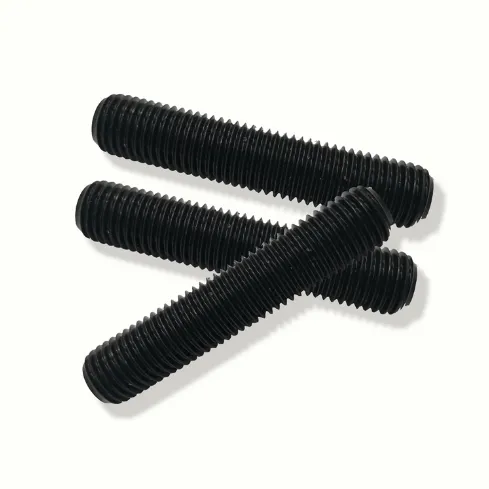screws washers factories
Dec . 10, 2024 12:04 Back to list
screws washers factories
The Comprehensive World of Screws and Washers Manufacturing
In today's rapidly evolving industrial landscape, the humble screw and washer play a pivotal role in ensuring the functionality and durability of countless products. From construction to electronics, the versatility of these simple fasteners makes them indispensable. This article delves into the intricacies of screws and washers factories, exploring their manufacturing processes, innovations, and the importance of quality control.
The Manufacturing Process
The production of screws and washers involves several stages, starting from raw material selection to final product packaging. The primary material used in the manufacturing of screws and washers is typically steel, though options such as stainless steel, brass, and plastic are also widely used depending on the application.
1. Material Preparation The first step involves sourcing high-quality raw materials that meet specific standards. Reliable suppliers are crucial, as the strength and durability of the final product depend on the quality of the material used.
2. Forming and Shaping For screws, the process often begins with wire drawing, where large coils of wire are transformed into thinner strands. These strands are then cut to length and shaped into the desired screw form using techniques such as cold heading or forging. Washers, on the other hand, are usually produced from flat sheets of metal, where they are stamped or cut into the required shape.
3. Threading One of the significant differences between screws and washers is the threading of screws. The threading process, which can involve either cutting or rolling methods, is crucial. It determines how well the screw will grip and hold parts together. Precision is key here, as any inconsistencies can lead to poor performance.
4. Heat Treatment To enhance the strength and durability of the screws, heat treatment is often employed. This process involves heating the screws to a specific temperature and then cooling them rapidly. This helps in achieving the desired hardness and tensile strength.
5. Surface Finishing Once the screws and washers are shaped, they undergo surface finishing processes. This can include polishing, galvanizing, or applying protective coatings to prevent rust and corrosion. The choice of finish not only affects the aesthetic appeal but also the longevity of the products.
screws washers factories

6. Quality Control Throughout the manufacturing process, quality control is paramount. Manufacturers employ rigorous testing methods to ensure that each screw and washer meets industry standards. This process can involve visual inspections, dimensional checks, and tensile tests to verify strength and durability.
Innovations in Manufacturing
Screws and washers manufacturers are continuously adopting new technologies to enhance production efficiency. The introduction of automation and robotics in factories has streamlined the manufacturing process, reducing production times and minimizing human error. Computer Numerical Control (CNC) machines allow for precise machining of screws and washers, enabling complex designs that were once difficult to achieve.
Moreover, additive manufacturing (3D printing) is starting to make its mark in the production of certain types of fasteners. This technology offers the possibility of creating customized screws and washers in small batches, catering to specific customer needs without the high costs associated with traditional manufacturing methods.
Environmental Considerations
As industries recognize the importance of sustainability, screws and washers factories are also adapting their practices to minimize environmental impacts. Many manufacturers are now focusing on using eco-friendly materials and processes. Recycling initiatives are becoming a common practice, where scrap metal from the production of screws and washers is collected and reused. Additionally, the implementation of energy-efficient machinery and waste reduction techniques helps in aligning with global sustainability goals.
The Future of Screw and Washer Manufacturing
The future of screws and washers manufacturing looks promising. With the continued growth of sectors such as construction, automotive, and electronics, the demand for high-quality fasteners is expected to rise. Companies that invest in innovative manufacturing technologies, prioritize sustainability, and maintain rigorous quality control will likely thrive in this competitive market.
In conclusion, screws and washers factories play a crucial role in our industrialized world. With advancements in technology and a commitment to quality and sustainability, the manufacturing of these essential components is set to evolve, meeting the ever-changing demands of modern applications. Whether you're assembling furniture or manufacturing machinery, the screws and washers that hold it all together will continue to be the unsung heroes of engineering.
Latest news
-
High-Quality Panel Stud Bolt Reliable Panel Stud Bolt Factory & Suppliers
NewsJul.08,2025
-
High-Precision Fine Thread Locknuts Manufacturer & Supplier Custom Solutions
NewsJul.08,2025
-
PH Imperial Stud Bolt – High Strength Fasteners from Leading Supplier & Factory
NewsJul.07,2025
-
High-Quality Allen Wrench Bolts Leading Factory, Company & Suppliers
NewsJul.07,2025
-
Wholesale Ball Stud Bolt - High Quality Supplier & Factory Price Reliable Wholesale Ball Stud Bolt Company
NewsJul.06,2025
-
High-Strength Alloy Bolts Manufacturer & Supplier Quality Alloy Fasteners Factory
NewsJul.06,2025
